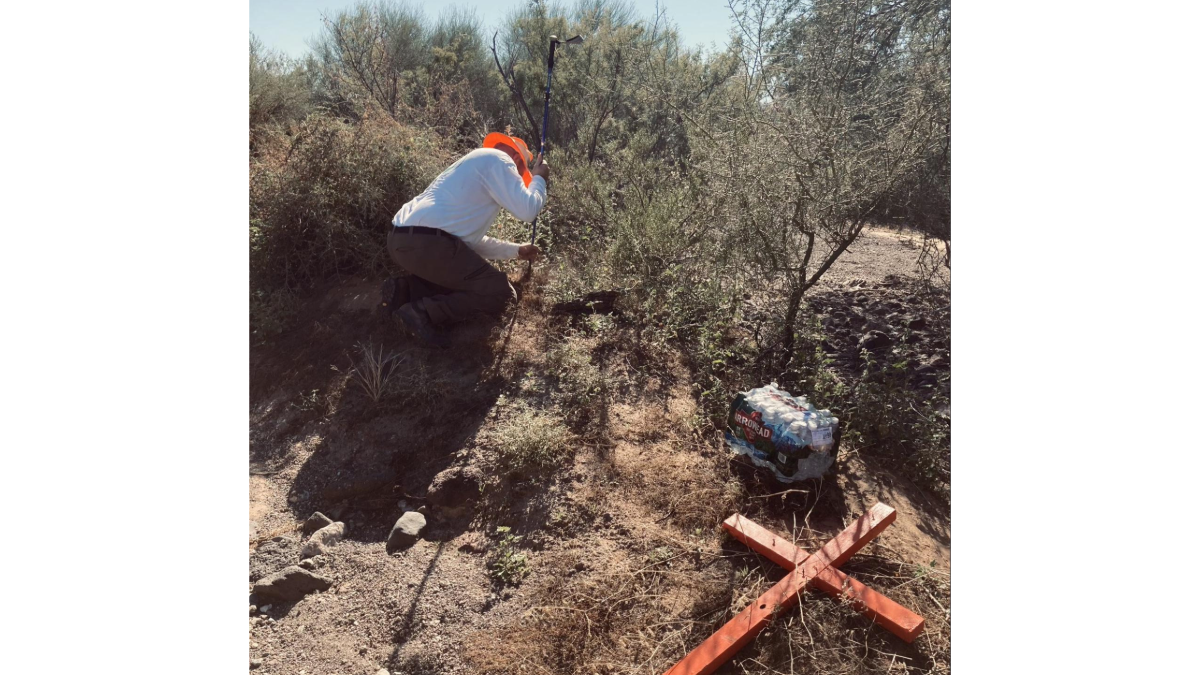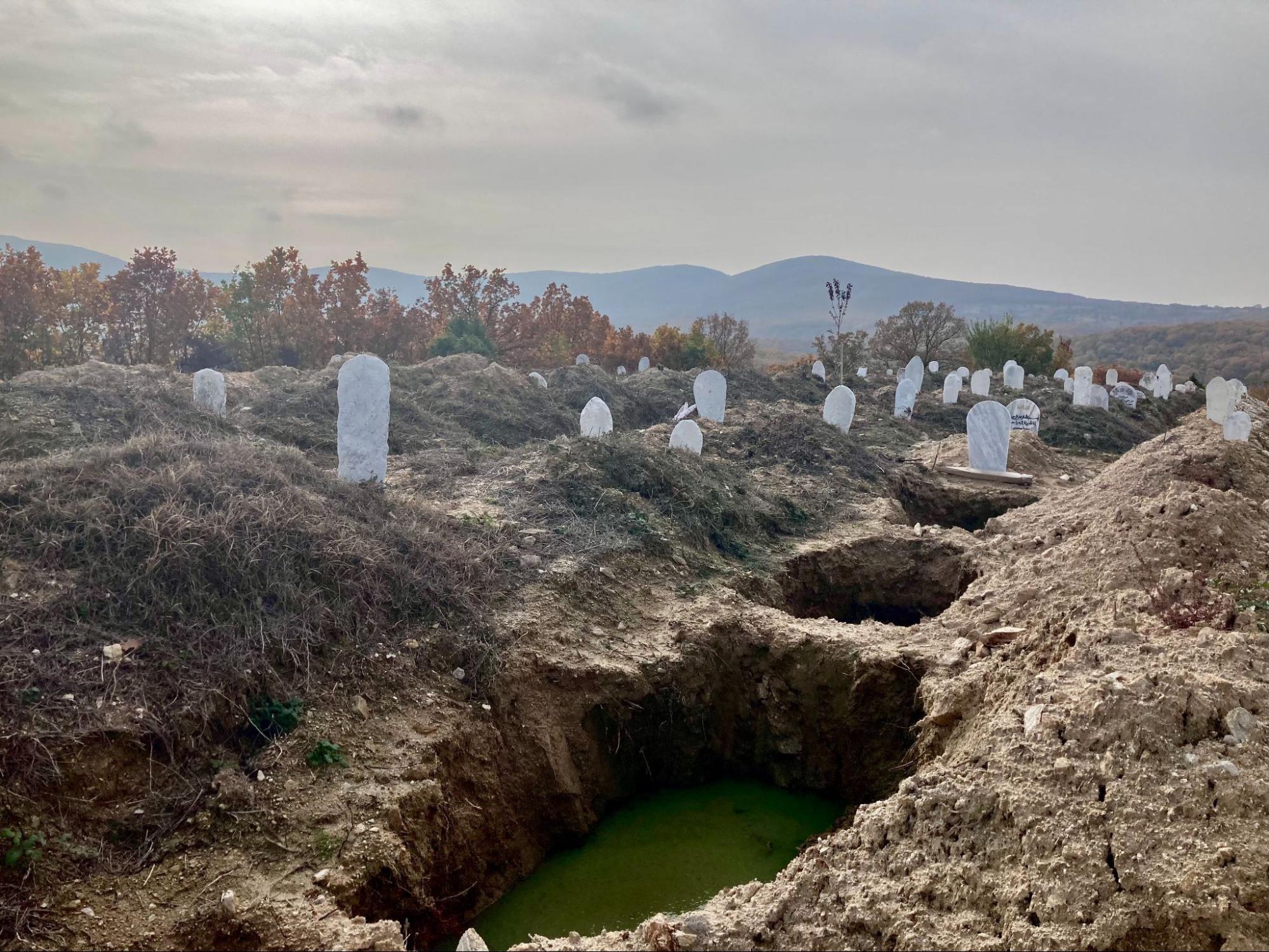In the War on Migrants, A Trump Win is Really a Win for Big Tech
Petra Molnar / Dec 4, 2024Petra Molnar is the author of The Walls Have Eyes: Surviving Migration in The Age of Artificial Intelligence, published by The New Press in 2024.

Border wall in Arizona, 2023. Photo by Petra Molnar.
“If you call them people - I don't know if you call them people. In some cases, they're not people, in my opinion.” - Donald Trump, November 16, 2024
Migration continues to be a highly contested political issue around the world. In the United States, immigration was one of the deciding issues in this year’s presidential election. Since his re-election on November 5, 2024, President-elect Donald J. Trump and his team have vowed to conduct the largest mass deportation in US history, assisted by the military; end birthright citizenship; militarize the border and introduce more border surveillance; reintroduce travel bans similar to the infamous Muslim travel ban in his first term; revive the “remain in Mexico” policy; penalize sanctuary cities that limit cooperation with federal deportation agents; greatly expand the ambit of ICE; deputize the National Guard to carry out immigration arrests; suspend refugee admissions; and more.
In the second Trump term, these policies will decimate communities and harm thousands. But borders have historically been violent spaces. As professor and former UN Rapporteur on Discrimination E. Tendayi Achiume argues, borders have long been predicated on exclusion and racial logics of belonging. According to writer Harsha Walia, borders are also practices of Western empire-building. Now, violent border policies are increasingly replete with digital technologies – invasive, high-risk, and violent technological experiments born in an ecosystem that is predicated on seeing migration as a “problem” to be solved.
Are We in an Episode of Black Mirror?
Watching a robo-dog steadily amble towards you with its uncanny gait is a viscerally disturbing image that does not easily leave you. Now, after days of walking through inhospitable desert terrain with little water, imagine a robo-dog running full speed towards you at the border. This is not an episode of Black Mirror or another sci-fi show, but a reality in a world where technology is the latest frontier in the war on migrants – with President-elect Trump’s victory cementing a lucrative and multi-billion dollar border industry built on the specter of an open border.
For my new book, The Walls Have Eyes: Surviving Migration in the Age of Artificial Intelligence, I spent 6 years documenting first-hand the impacts of violent border policies at the US-Mexico border and in places like Palestine, Greece, and East Africa, focusing on the introduction on digital border surveillance, automation, and AI. Technologies like drones and AI surveillance towers and more dystopian projects like the Department of Homeland Security’s (DHS) robo-dogs push people on the move into life-threatening terrain, resulting in violence and discrimination against people exercising their right to seek asylum.
This is not an abstraction – thousands of people die every year making dangerous crossings across the beautiful yet deadly Sonora desert, people like Elias Alvarado, a young husband and father from Central America who came to the US in search of a better life for his family and died in a dusty river bed in Arizona. In the spring of 2022, the same week that DHS unveiled its robo-dogs, I visited the place where Mr. Alvarado died with a search and rescue group, The Battalion Search and Rescue, led by James Holeman, a former US marine motivated to help.

James Holeman fixes a wooden cross at the memorial site of Mr. Elias Alvarado, February 2022. Photo by Petra Molnar.
Importantly, the Trump presidency is not the only one that we must critique. Much of the expansion of surveillance occurred under the Obama and Biden administrations, with the Democrats presenting ‘smart borders’ as a more “humane” alternative to walls and cages. However, as scholars Geoffrey Alan Boyce, Samuel N. Chambers, and Sarah Launius show in their peer-reviewed paper in the Journal of Borderland Studies:
...‘high-tech’ border solutions failed to deliver on their operational objectives; instead of preventing unauthorized crossing, the surveillance network simply shifted migration routes into much more difficult and remote terrain, with a measurable impact on the geography of migrant deaths in the southern Arizona desert.
Surveillance and death go hand in hand. These turns towards techno-solutionism weaken the refugee protection system not only in the US but also globally. For example, the EU has long been experimenting with various carceral technologies in refugee camps and border policing, leading to thousands of deaths. 2024 has been the deadliest year for people on the move drowning in the Mediterranean sea, ensnared in an ever-growing surveillance dragnet that has claimed thousands of lives.
We are seeing the latest manifestation of fear-based policymaking that is going to hurt thousands of people around the world.

Graveyard for people on the move who died making the dangerous crossing into Europe, Evros region, Greece. Photo by Petra Molnar, 2023.
Tech Bro-ification of the Border
Policymaking does not occur in isolation. Major technology companies and investors are now fully part of the political machinery in an increasingly lucrative military and border industrial complex.
For example, Elon Musk has been a mainstay throughout the Trump campaign, strategically positioning himself as a purveyor of 'truth' through his platform X, formerly Twitter. As one of the president-elect's most important backers, the tech billionaire spent more than $200 million to fund a Super PAC aimed at re-electing Trump. Just as a business proposition, the strategy paid off. Tesla's stock rose by 14% on the morning after the election, and Musk’s personal wealth soared by $70 billion. But Musk’s gains will be more than just financial from this Trump victory. As a close ally to President-elect Trump, Musk will have easy access to change policies and weaken regulations to his benefit, such as surrounding his maligned Tesla self-driving system, which is currently being investigated by the US National Highway Traffic Safety Administration. Trump’s win will mean less regulation and oversight in an already dangerous playground where innovation takes precedence over human lives.
But Musk is just one – if perhaps the brashest – tech bro who will benefit. Peter Thiel, the founder of Palantir Technologies, has more quietly been laying the groundwork for years, supporting Vice President-elect JD Vance’s meteoric rise through politics while making giant inroads in the military and border industrial complex through surveillance at the US-Mexico border and with lucrative contracts with Homeland Security as well as internationally with organizations like the World Food Program.

Israel’s Elbit Systems AI surveillance tower in Arizona. Photo by Petra Molnar, 2024.
And the political influence of tech companies does not just stay within the borders of America. Israeli surveillance companies like Elbit Systems and Cellebrite are also mainstays of the border industry, operating AI surveillance towers at the US-Mexico border, while tools like Pegasus developed by the Israeli cyber-arms company NSO Group have been used around the world to spy on dissidents, journalists, and Palestinians alike. Indeed, we are witnessing a tech-facilitated genocide, with AI-powered targeting systems with gentle names like Lavender and The Gospel murdering Palestinians in the Gaza Strip and facial recognition-powered mass surveillance trapping people in the occupied West Bank in a digital prison. On November 14th, 2024, the UN Special Committee to investigate Israeli practices found Israel’s warfare methods in Gaza are consistent with genocide, raising serious concerns about the use of AI-enhanced targeting systems:
The Israeli military’s use of AI-assisted targeting, with minimal human oversight, combined with heavy bombs, underscores Israel’s disregard of its obligation to distinguish between civilians and combatants and take adequate safeguards to prevent civilian deaths.
On November 21st, the International Criminal Court issued a long-awaited arrest warrant for Israel’s Prime Minister Benjamin Netanyahu and former Israeli Defence Minister Yoav Gallant. It remains to be seen how the court addressed the growing use of AI in this prosecution of war crimes and crimes against humanity.
Given President-elect Trump’s statement that Israel needs to “finish what they started,” these companies are going to further cash in as the US-Israel relations further terrorize Palestinians, normalizing the technologies tested out in Gaza and the West Bank and repurposing them for border enforcement in the US and EU.

Hebron, a labyrinthine test bed of surveillance technology aimed at Palestinians. Photo by Petra Molnar, 2023.
The power of the private sector – and the tech sector in particular – has grown exponentially, and with President-elect Trump’s re-election, technology is the next frontier of warfare and repression globally. At the same time, social media platforms propagate incitement, hate speech, and genocidal narratives that contribute to the current political and public climate in which historically marginalized communities are stereotyped, labeled, dehumanized, and oppressed. The few promising efforts to put up guardrails and draw a red line under high-risk and harmful technologies have all fallen flat, including the EU’s long-awaited and recently ratified AI Act, which is woefully inadequate to address the impacts of technologies on historically marginalized communities. The Biden Administration’s Executive Order on AI is silent on migration and border tech, paving the way for the Trump Administration to do whatever it pleases in its war on immigrants.
And while focusing on border tech may at first seem like a narrow issue to worry about, border tech does not just stay at the border. A year after the Department of Homeland Security announced its experiment with robo-dogs, in May of 2023, the New York City Police Department proudly unveiled its intent to use robo-dogs “to help keep NYC safe.” One of the devices is painted white with black spots on it, like a Dalmatian.

Screengrabs from TikTok, 2023, Petra Molnar.
Recognizing the role of powerful private sector players – now with unfettered access to the Oval Office – and unregulated tech platforms in adding a new layer of oppression to already struggling communities is not just essential. It is crucial for the very survival of democracy.
How Do We Cultivate Hope?
“Hope is a Discipline” - Mariame Kaba, abolitionist writer, activist, and author
In a fracturing world, how do we find a way through? Borders close us off from one another, and the social abandonment produced by capitalist societies amplifies our differences. Instead, how do we find ways back to each other in this time of division?
1. Mutual aid
Especially in times of crisis, mutual aid, or the collaborative model where people exchange resources and services, is crucial to overcome barriers to meeting common needs. Writers like Dean Spade show us how mutual aid is a form of organizing where people get to create new systems of care and generosity so we can survive.
2. Information sharing
Part of mutual aid is information sharing about the state of play, empowering communities to learn about their rights. Groups like the Transnational Institute, StateWatch, AlgorithmWatch, and The Surveillance Technology Oversign Project (STOP) are just some information repositories on surveillance technologies
3. Following the money
Private sector actors must be held to account, and people must push for divestments from the private sector to dismantle the border industrial complex. The work of people like journalist Todd Miller at The Border Chronicle is crucial here, as well as various campaigns like #NoTechforICE and #NoTechforApartheid.
4. Strategies of resistance through existing legal structures
Current immigration and refugee law and its legal structures are far from perfect, but they can provide mechanisms of resistance through strategic litigation, pushing policymakers to amend legislation (see the Protect Not Surveil campaign around the EU’s AI Act).
5. Co-opting and resisting technologies
Not all technologies are bad! Our own Refugee Law Lab uses technologies and data analytics to improve algorithmic justice for people on the move and empower immigration lawyers with data and information through data analytics.
6. Supporting actors engaged in the space
Much of the hard day-in day-out work is done by civil society groups that need support, such as Mijente, Just Futures Law, Surveillance Resistance Lab, Battalion Search and Rescue, R3D, Border Violence Monitoring Network, and others working directly with affected communities.
7. “Nothing About Us Without Us:” Strategies of Resistance by People On the Move
People on the move are often left out of conversations around technological development. Like other historically marginalized communities, their lives serve as testing grounds for experimental new technologies. Ultimately, people on the move need to be seen as the experts on border technologies. Our project, The Migration and Technology Monitor, tries to open up some of these spaces of collaboration, care, and co-creation of knowledge, funding projects by colleagues in displacement working on the impacts of border technologies.

Many things still grow under occupation. The author purchased these strawberries in Ramallah, one of the only exports allowed from Gaza in the spring of 2023. Photo by Petra Molnar.
Acts of resistance happen in large ways and small—from changing laws and speaking truth to power to sharing stories and witnessing one another’s common humanity. The power brokers behind violent technologies would have us believe that politics of fear and difference should drive innovation to further divide us. But little by little, a new world can be built— as sociologist Ruha Benjamin reminds us in her book Viral Justice, a “reworlding” is possible. Hope is indeed an act of resistance, as is joy, rest, and sharing time together. As Benjamin says, in this, we will find “a kind of stubborn beauty, a joy that refuses to kneel in defeat.”
Related Reading
Authors
